How to Write a Good Hook for an Essay
Last updated: July 2019
"You have to make choices even when there is nothing to choose from."
― Péter Zilahy
And you have to find a perfect hook for your essay even when you don't know what to write.
Strategies for writing an essay hook:
- Use literary quotes.
- Write a quote from a famous person.
- Surprise with a misconception.
- Write an anecdote.
- Tell a personal story.
- Use statistical data.
- Ask a question.
- Share a fact or a definition.
- "Draw" a scene.
- Start with a thesis statement.
The #1 prejudice most students have on essay writing: it's time-consuming, difficult, and bo-o-oring.
False.
When teachers ask you to write an essay, they don't want to ban your creativity. An essay shouldn't be boring or too formal but make readers want to check its every word. And your task is grabbing and keeping their attention throughout your writing.
An essay hook is that particular instrument you need to meet this challenge.

image: Gratisography
What is an Essay Hook?
"An essay hook is 1-2 opening sentences of your paper. They serve to capture readers' attention and help them decide if they want to continue reading your text.
We call it a "hook" because it reminds a shiny lure that fishermen use to catch a fish. And, depending on the fish they want to catch, they will use different hooks.
Do not confuse hooks with introductions! An essay hook opens your introduction rather than substitutes it. Once you've hooked readers, be sure to introduce your essay topic and thesis.
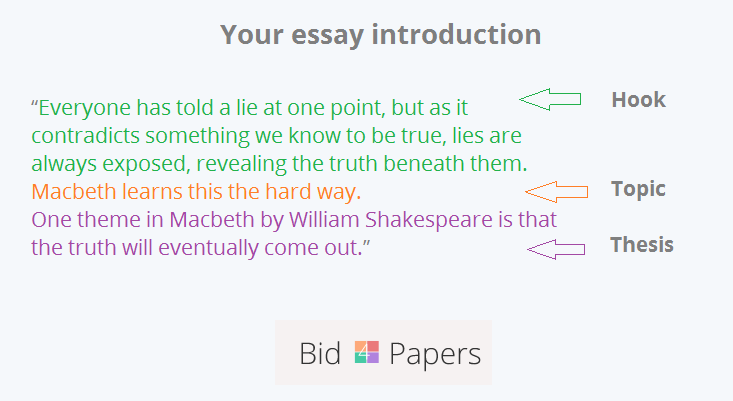
- A hook. Write a strong opening sentence capturing readers' attention.
- A topic. Tell readers about the focus of your essay.
- A thesis. State your opinion on the topic.
Essays and college papers are not alone in hooks. Fiction writers, copywriters, bloggers, screenwriters, and other men of letters use this instrument to gain our interest and influence our decisions. Did you hear about David Ogilvy and his timeless lessons to writing and standing out? He's a true genius of hooks and persuasion!
Essay hooks can be difficult to generate, especially if you are still in the process of thesis clarification. The first step toward writing an eye-catching opening for your essay would be answers to these questions:
- What is the type of your essay?
- What writing style and tone do you need to use?
- Who is your intended audience?
- What text structure do you need to establish?
A PRO TIP: Write a hook and introduction after you've finished the whole essay. It will help to clarify a thesis and understand what type of hooks would fit your work better.
To get a better idea of what a terrific introduction looks like, watch the video tutorial from James, who defines essay hooks as grabbers.
Essay Hooks Ideas
So, what types of opening lines can you use as a good hook for an essay?
1) Literary Quotes
This type of hooks works for essays about writers, literature phenomena, books, etc. Start your essay with a quote from books you review, and it will establish your authority as a writer.
Examples:
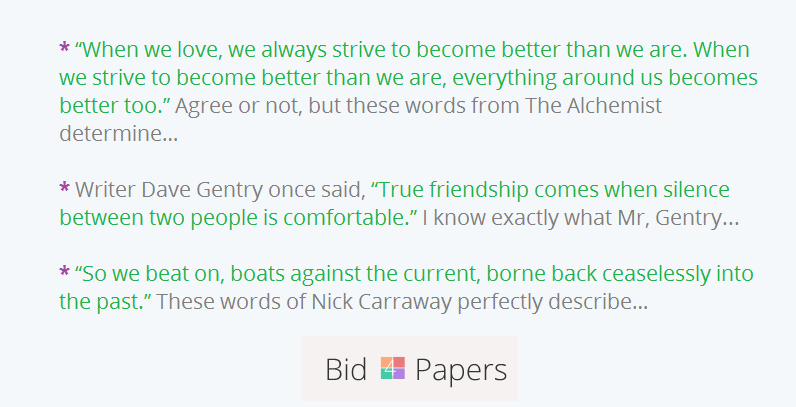
2) Quotes From Famous People
To support your argument and create a lip-smacking hook for your essay, start it with a quote from famous people. But make sure it's relevant to your topic and thesis.
Examples:
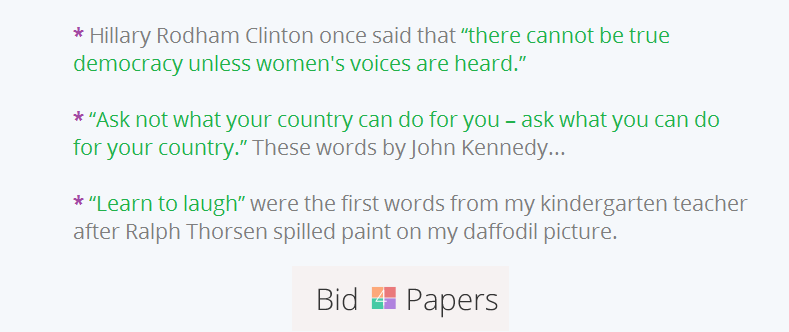
That's all well and fine but…
Some teachers consider this type of essay hooks too general and overused. They discourage college papers started or finished with words of influencers, not students themselves. So, if you decide to use such a hook, find a rare yet relevant quote. Don't copy-paste the first available saying from top quotations websites.
3) Common Misconception
You may start your introduction with a statement about a commonly accepted truth being false. That will intrigue your audience and encourage them to keep on reading.
Examples:
- "Most Americans mistakenly believe that all rice is essentially the same."
- "Most coffee addicts would tell you their favorite drink comes from a bean, but they are wrong. Coffee is made from a seed called a bean."
4) Anecdotes
"An anecdote is a little story designed to illustrate a point you are trying to make.
This hook is appropriate to use if you write narrative or descriptive essays. Don't be afraid of writing funny openings, as it doesn't mean your essay has to be humorous too. A little humor helps to grab readers' attention and spark their interest in the topic.
Your anecdote should be short and to the point. Make sure it relates to the main idea of your essay.
Examples:
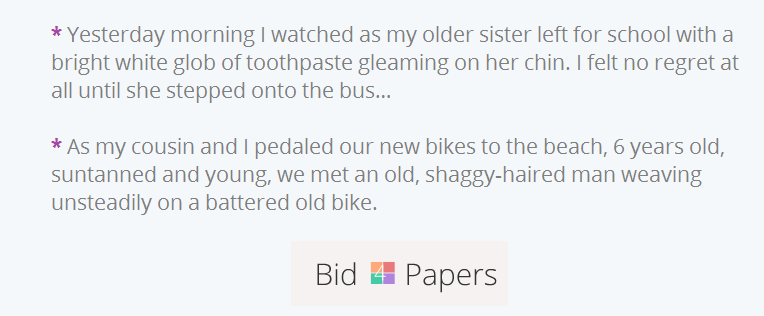
Remember that most essay assignments don't allow to write from the first person. Be sure to check the requirements before using "I" in your writing.
5) Personal Stories
This hook is perfect for personal narratives or college application essays, though you would hardly use it for argumentative or too formal persuasive papers. Ask your professor if you can use personal pronouns in your writing, and hook readers with a personal story which not necessarily should be yours.
You can tell the story of your friend, relative, or president. Why not, after all?
Examples:
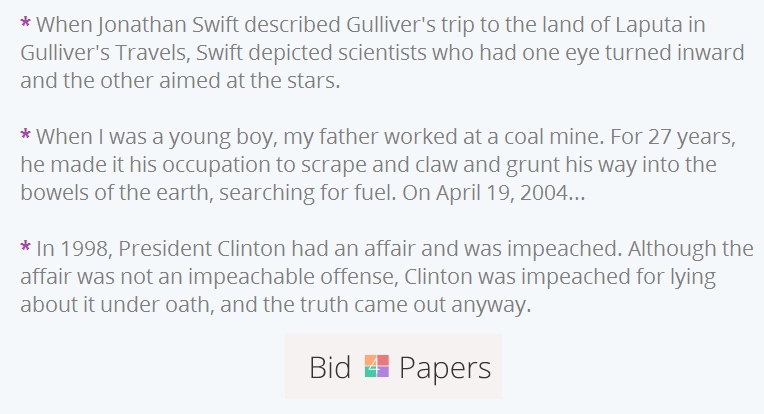
But please, don't start your essay with a hook like "I was thinking about what to write for this essay and came up with this."
Teachers hate it! Sure, this hook is better than no hook at all, but it will never distinguish your work from the crowd.
6) Statistics
Use statistical data to hook readers with new facts they might not have been known. Be sure to include the source.
Examples:
- "People lie in 1 out of 5 conversations lasting more than 10 minutes, according to Allison Komet from the Psychology Today magazine."
- "70% of all jobs found today were got through different networking strategies."
- "Fifty percent of marriages end up in divorce."
- "The average iceberg weighs over 100,000 metric tons."
Do research to find data on your topic. Refer to sources your teacher would consider reliable.
7) Questions
This type of hooks can help you create a reader's personal interest in your essay and wish to continue reading it. But don't make your question too general.
Let's say you write an essay about smartphones. Asking a question a la "Do you have a smartphone?" will hardly grab readers' attention because it doesn't engage them in critical thinking.
So, try to avoid questions expecting simple Yes or No answers.
Examples:
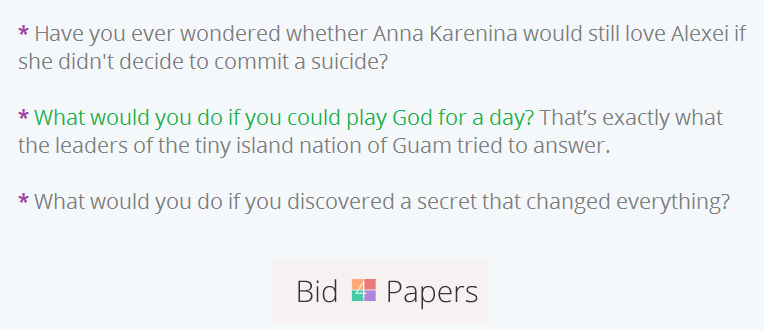
Rhetorical questions could be a good idea for essay hooks.
As well as quotes from famous people, they are easy to create and, therefore, overused too. You'll need to wind up your brain to impress a reader and make that question catchy.
8) Fact/Definition
This hook can surprise a reader with something they might not have known. Interesting facts about what you are going to discuss in your essay will intrigue your audience and make them want to learn more.
Examples:
- "Spain, though hardly a literary juggernaut, translates more books in one year than the entire Arab world has in the past one thousand years."
- "Amiable is the best way to describe Elizabeth's personality: she was friendly and caring."
Be careful with definitions! Your professor will hardly like your essay opening if you copy it from a dictionary. So, if you decide to start an essay with a definition related to your topic, avoid something like this:
- "Webster's Dictionary defines 'truth' as 'the state of being the case; factual; the body of real things, events, and facts'."
A bold pronouncement, outrageous statement, or exaggeration will help you hook readers, too.
Examples:
- "If you say you've never told a lie, then you're lying."
- "Cigarettes are the primary cause of cancer."
- "If the government cuts any more money from education, the entire country will crumble."
9) Scenes
People are visually-oriented. Depending on the type and length of your essay, "draw" a scene in your hook to help readers "see" a clear picture in mind.
Decide on a scene that would appeal to senses and set the mood for your essay.
Examples:
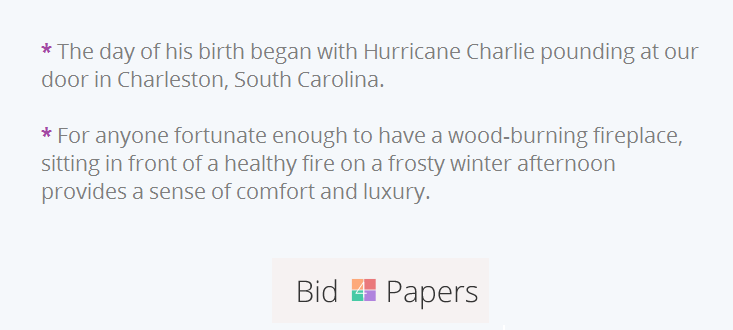
10) Thesis Statement
There is no harm in getting right to the point. Start with your argument and support your point of view throughout the essay. If you have an interesting take on a subject, readers will want to see where you came up with your idea.
Examples:
- "It is time to reveal the truth about Thanksgiving, and the truth is that Thanksgiving is not such a terrific holiday…"
- "Humans need to invest more time and money into space exploration because Earth is on a certain path to destruction."
So many hooks, so many essays. The logical question appears: how do you know what type of openings in the introduction would fit your paper best?
Well, you might ask our writers to help you or continue reading this post to get more tips on writing hooks for your essay.
How to Choose a Good Hook for Your Essay
With so many types of essay hooks, you wonder how to choose the right one for your particular paper. The problem is, there's no single formula here. To know what hook to consider, keep in mind the following:
- Your audience
- Your essay type
Depending on who reads your essay, one and the same message will speak in different ways to them.
It's clear that a hook you use to attract a college girl would hardly help you spark the interest of a college admission counselor. So, the first question to answer before going on the writing road is:
- Who is my audience? Whom do I want to target with my essay?
Then, try to figure out what matters to your readers and what they expect to get from the essay.
- Do they read it to solve a problem?
- Do they want to learn interesting facts about you?
- Do they need distinctive information on the topic?
- Do they want to see that you understand a subject?
Once you've nailed it down, you'll know what types of hooks will work for this particular writing.

Source: Giphy
The type of hooks that would fit your paper best depends on the essay type, either.
For example, anecdotes don't work for writing a critical précis, but they would catch readers of dialectic essays. Quotes and questions are perfect hooks for novel critiques or persuasive essays, while facts or statistics fit argumentative essays best.
Don't start your essay with a great hook simply because it's great. It should be relevant to your topic, thesis, and purpose of your paper.
Questions to answer before choosing an essay hook:
- How do I want my readers to feel?
- What do I want my readers to learn?
Depending on feelings you want to evoke, an essay hook may be some shocking statistics, a romantic personal story, a funny anecdote, a motivational quote, etc.
Depending on the purpose of your writing, make an essay hook reflect it. Common misconceptions or outrageous statements may encourage readers to learn something new, while catchy questions would engage in critical thinking or motivate.
Conclusion
Essays are many. Narrative, persuasive, argumentative, or descriptive – they all need hooks, aka grabbers to attract readers to your writing. These grabbers are many, either. To choose the best one for your paper, consider a type of your essay, its audience, and their needs.
And remember:
No matter how strong they are, hooks alone can't guarantee A+ grades for your writing assignments. State a thesis, organize research on the topic, and outline your essay before choosing a grabber for it. Opening lines lead the way of your papers and make them worth reading.
How to Write a Good Hook for an Essay
Source: https://bid4papers.com/blog/hook-for-essay/